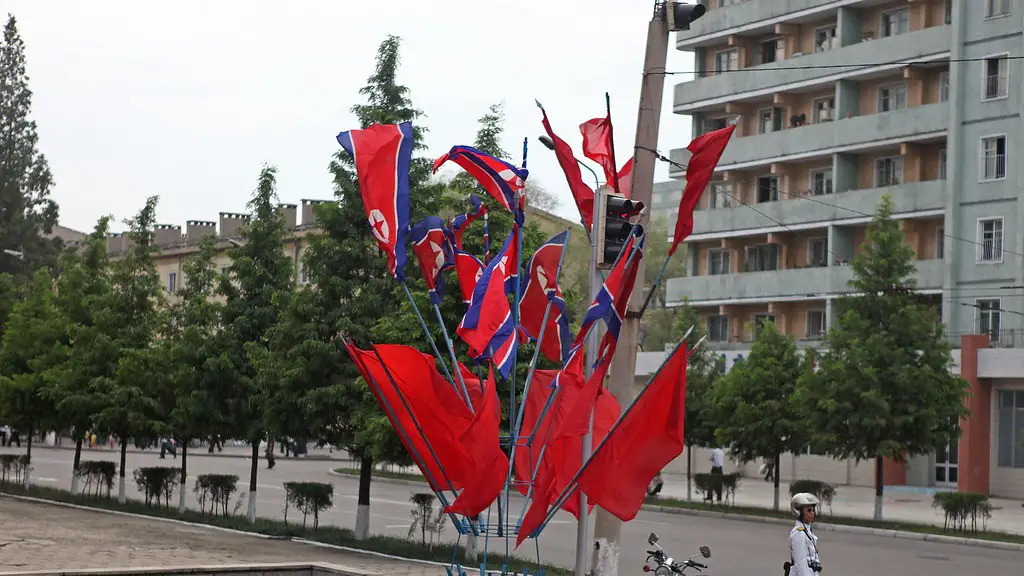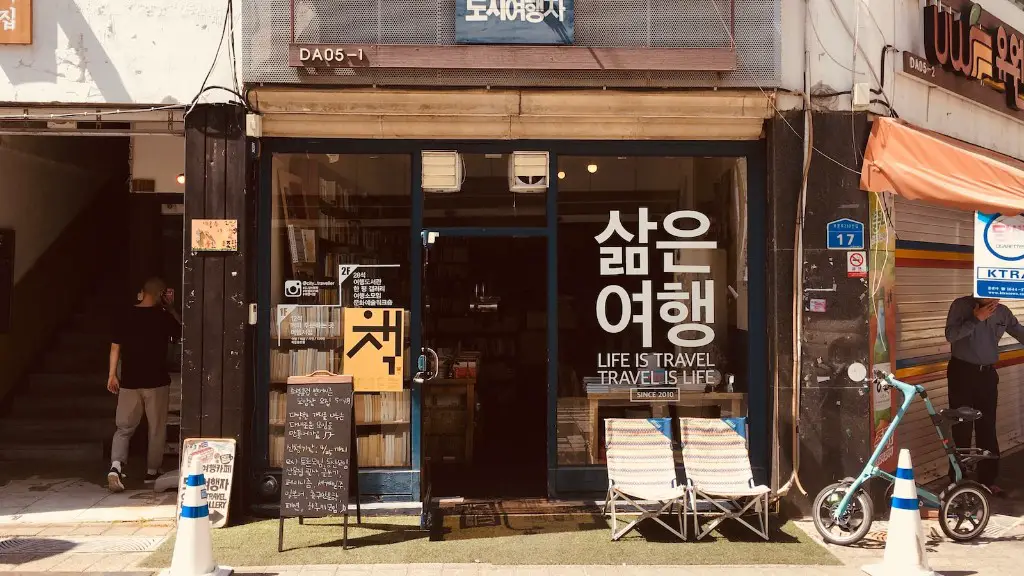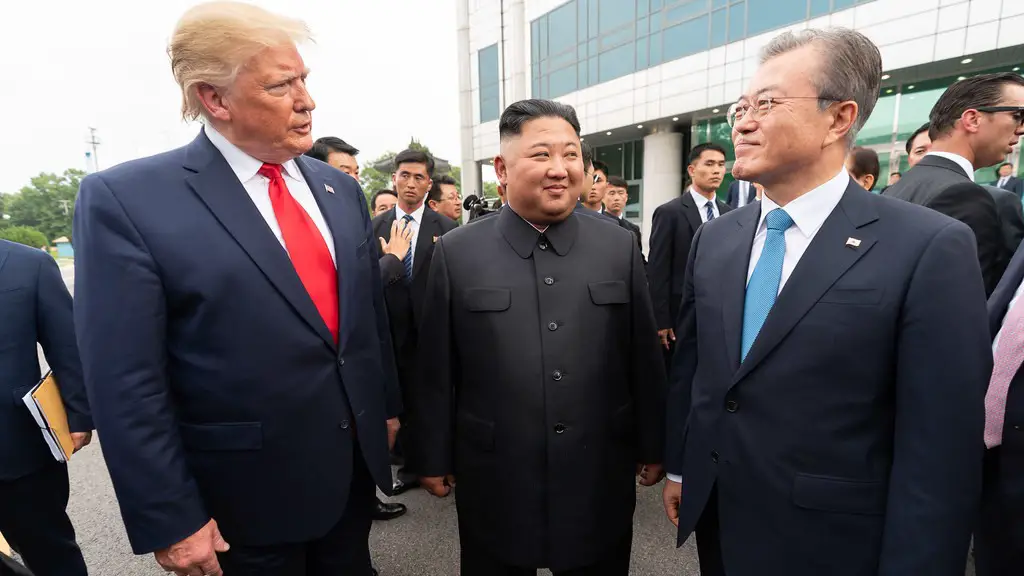Background Information
North Korea, officially known as the Democratic People’s Republic of Korea (DPRK), is a mountainous country situated in East Asia bordering South Korea, China, and Russia. The capital, Pyongyang, has been under rule of the ruling Workers’ Party of Korea (WPK) since the country was founded in 1948. The WPK and its leader, Kim Jong-Un, have maintained a strong grip on power, with tight control over the vast majority of the nation’s resources and wealth. As a result, North Korea is one of the most closed-off countries in the world and has the lowest living standards of any industrialized nation.
poor quality of life
The United Nations Development Program (UNDP) estimates that more than 20 million citizens, roughly 80% of the population, are living in extreme poverty, with a large portion of their daily caloric intake coming from food aid. On average, North Koreans are eating just 1,972 kilocalories per day – far below the globally recommended 2,100 kilocalories per day. With an average working day of more than 12 hours and a minimum wage of around $6/month, almost everyone is struggling to make ends meet.
Furthermore, the majority of households earn barely enough to cover essential needs such as food, rent, and medical expenses. Education is not free, with parents needing to pay for textbooks, equipment, and uniforms. The quality of education received is also reported to be inferior compared to South Korea or other developed countries, as the state fails to properly invest in the sector.
Political Restrictions Affecting Economy
The major underlying cause of poverty in North Korea is largely attributed to the authoritarian political system, with policies that aimed to restrict private enterprise and foreign investment. The government prohibits citizens from dealing with foreign companies, severely limiting imports and exports. Additionally, the country is subject to extreme international sanctions that have been in place since the 1940s, limiting trade and resources even further.
Despite North Korea’s seemingly resource-rich landscape and abundance of minerals, none of the national resources have been developed to the extent of being able to contribute to the gross domestic product. The mining sector, for example, is almost completely unregulated by the state and the resources are often smuggled across the border.
Lack of Investment from Abroad
Further exacerbating the economic woes of North Korea is the lack of investment from abroad, with most of its neighbor countries taking a more cautious approach towards the regime. For instance, China, North Korea’s closest and most powerful ally, has been reducing its trade volume with North Korea since 2017 due to tightening US sanctions. This has rendered any potential Chinese investments in North Korea’s infrastructure and industry highly unlikely.
At the same time, South Korea views any investments in North Korea as an act of support towards the authoritarian regime and thus, is not keen to invest. Additionally, multinational companies have been uncertain in regards to North Korea’s political turmoil and are thus hesitant to invest in the country.
Inadequate Healthcare System
The inadequate healthcare system in North Korea is also contributing to the nation’s already impoverished condition. With over 60% of the population living in rural regions, where access to health services are extremely limited, it is estimated that one-third of all North Koreans lack access to essential medical care. Furthermore, the cost of medical treatments is said to be prohibitively expensive for the average North Korean, with only the 1% of the population that holds party elites or the military having access to high-quality treatments.
The healthcare system has also been crippled by the inadequate availability and quality of medication, as well as the poor infrastructure and funding. For instance, many hospitals and medical facilities lack even the most basic of medical equipment, and there are shortages of even common medications such as painkillers, antibiotics, and nutritional supplements.
Millions Affected by Food Insecurity
The United Nations estimates that around 10.6 million people in North Korea are facing acute food insecurity. This means that on average, over 40% of the population is facing chronic food shortages, no thanks to the country’s failing agriculture sector. The sector is affected by the inadequate availability of arable land, harsh weather conditions, and lack of modern technology, resulting in crop production drastically lower than what it should be.
This is compounded by the regime’s policy of prioritizing military and government spending over the needs of the general public, as well as failing to distribute food among the population. In addition, the United Nations’ World Food Programme (WFP) estimates that more than two-thirds of North Korean families need to resort to foraging for food such as grass, nuts, and acorns in order to survive.
Little Hope for Change
Given the lack of democratic and economic reforms in the country, the future of North Korea’s economy remains uncertain. The state’s continued isolation and political turmoil have created an entrenched poverty-stricken society, with millions of North Koreans struggling to make ends meet.
The national average gross domestic product (GDP) per capita stands as one of the lowest in the world, costing North Korea an estimated $6,718 in 2018 compared to the global age of $15,482. Given the current state of the economy and political instability, the outlook for the country remains bleak and little hope is left for any improvement in the immediate future.
Burden of Military Spending
The authoritarian regime’s continued focus on military spending is another major contributing factor to North Korea’s economic woes. The reported military budget for 2017 was estimated to stand at $8 billion, representing nearly a quarter of the nation’s GDP. This equates to north of $150/person for military expense, a figure that is well above the global average of around $10/person.
Such exuberant levels of military spending have left North Korea with few resources to invest in the nation’s increasingly crumbling infrastructure. With money diverted away from the people’s most basic welfare needs, it is only understandable that the poverty rate continues to remain high in the country.
Human Rights Violations
The country’s dismal human rights record is also a factor contributing to North Korea’s impoverished condition. According to the US State Department, North Korea has among the worst records of human rights in the world, with horrific punishments meted out against political opponents and dissidents.
The regime often diverts resources to labor camps, concentration prisons and other repressions methods that affect both the public and political life of North Korea’s citizens, further entrenching the cycles of fear and uneven power between the elites and the population.
Failure of Central Planning
The outdated policy of central planning by the government has blocked any potential development in North Korea’s economy. With little to no private enterprise, the market is lacking liquidity and experiences low consumer demand.
Moreover, North Korea’s heavy emphasis on centrally planned projects has caused a significant drain on the national budget, resulting in an inefficient economic output for the country. In addition, its citizens are not allowed to do business or form private companies, leaving them with little choice but to work with the limited resources that the government provides.
Potential Solutions
A range of potential solutions have been suggested in order to alleviate North Korea’s economic woes. Among these proposals are increasing foreign aid and investments, coupled with diplomatic talks between the USA, South Korea, and China. However, for any of these solutions to be effective, the beginning of reforms within North Korea needs to be addressed first.
For any reforms to be effective, the country’s authoritarian regime will need to be willing to initiate drastic changes on their home ground that address the root causes of poverty. This includes loosening its control of the private sector, allowing foreign investment, and relaxing its control of labour and civil society.
Clampdown on Corruption
Corruption is also a major concern in North Korea, with the ruling elites often diverting money and resources away from key infrastructure projects and towards their own personal gains. This is further compounded by the lack of government transparency, which makes it difficult to monitor the use of public funds.
It is thus necessary for the nation’s ruling elites to clamp down on any corrupt officials and initiate reforms on the country’s financial and economic systems. The government should also improve public access to information and establish channels of public transparency and accountability, in order to ensure that the nation’s resources are used for public needs, rather than the interest of the ruling elites.
Public Engagement
The government should also involve the public in policy decisions so as to ensure that their concerns are heard and acknowledged. As it stands, North Korea’s citizens have little to no say in regards to the decisions taken by the government, and any opinion they may have on policy changes is barely considered.
This contributes to a sense of powerlessness among North Koreans, which in turn makes it difficult for them to take initiative and demand accountability from the government and its leaders. Initiating regular dialogues between the ruling elites and the North Korean people would be a step in the right direction and help to create a more transparent and responsive government.
Conclusion
In conclusion, North Korea is one of the most impoverished countries in the world, with its citizens facing acute food insecurity and extreme poverty. Its authoritarian regime and failure to develop the nation’s resources has played a major role in the nation’s poverty and it remains to be seen whether the country will be able to develop economically.
In order for North Korea to exit its economic woes, international cooperation and internal reform is needed. Together, these solutions can ensure that the nation’s resources are used efficiently and that the people of North Korea can finally receive the help they so desperately need.



